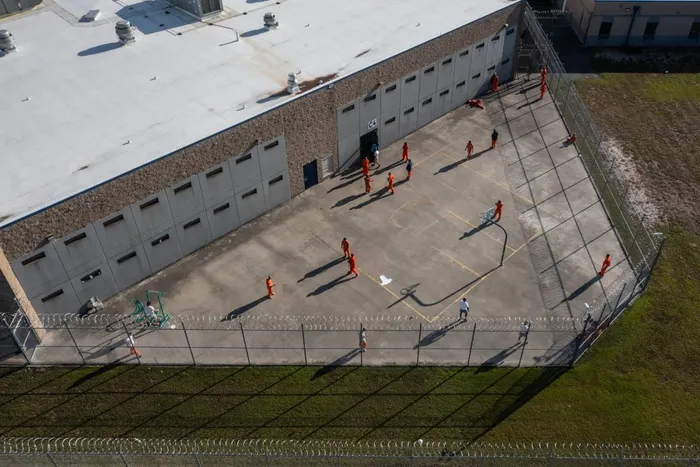
This aerial view taken on September 9, 2025 shows inmates in the yard at the Folkston Immigration and Customs Enforcement (ICE) Processing Center in Folkston, Georgia.
Image: AFP
Few places in the small African kingdom of Eswatini have a more feared reputation than the Matsapha Correctional Centre, a high-security sprawl of concrete and rust outside the capital, Mbabane.
"It's like a jungle," a former detainee told AFP of the prison that is holding 14 men deported from the United States in the Trump administration's crackdown on migrants.
For decades, the prison has embodied the repressive policies of the southern African nation, routinely used to silence critics and pro-democracy activists.
Now, as the United States expels foreign nationals, the prison has an additional and just as troubling role, lawyers say.
Africa's last absolute monarchy has agreed to accept up to 160 US deportees in exchange for $5.1 million to strengthen its border and migration systems, according to a deal seen by AFP.
"Life is not easy in there," said former detainee Elvis Vusi Mazibuko, who spent more than two decades at Matsapha on robbery and car theft convictions.
"It's survival of the fittest," the soft-spoken 64-year-old told AFP, recalling tensions flaring over minor disputes in cramped cells.
The first five US deportees were jailed at the prison in July, with one later repatriated to his native Jamaica.
Washington branded them "depraved monsters" convicted of crimes including child rape and murder. Lawyers told AFP they had already served their time in the United States.
Ten more arrived in October, according to the Eswatini government, which says it intends to repatriate them all.
They are being held without charge and access to legal counsel, according to an AFP investigation.
Washington has also sent deportees to other African countries such as Ghana, Rwanda and South Sudan.
A veteran prison warden told AFP there was unease over the US deportees.
"We haven't been trained to handle prisoners like these," he said on condition of anonymity. "We don't have the equipment either."
"If America couldn't keep them, what can a mere Swaziland do?" he asked, using the landlocked country's former name.
Matsapha is divided neatly between medium- and maximum-security wings.
New blocks funded by the deal with Washington, and where the US deportees are held, are on the minimum-security side, another officer said.
Unlike the older blocks where inmates share toilets in dormitories of bunk beds in rows, the new cells come with individual bathrooms and mounted televisions. The walls are transparent, allowing for constant surveillance.
There are concerns that the new wing could also be used to house political dissenters.
"We are a country that does not foster political participation," said lawyer Mzwandile Masuku, who has challenged the deportations in court.
"We will find more Swazis being accommodated in these newly constructed structures than addressing the problems that we have," he said.
Although access to the prison is tightly controlled, AFP was recently able to enter part of the complex without an escort.
Four officers guarded an outer gate, ushering visitors to a driveway edged with chartreuse flowers, royal palm trees, and a violet haze of jacarandas.
Further along was the Correctional Services Training College, where officers for all 11 of Eswatini's prisons are trained.
At a staff canteen, plastic chairs were arranged before a television showing English Premier League matches.
Beyond the staff quarters of rows of ageing cottages was a newly raised concrete perimeter said to be part of renovations quietly funded by Washington.
As of October, the prison held more than 1,560 inmates, according to a source familiar with its operations.
King Mswati III this year ordered early releases to ease overcrowding.
The day of a prisoner begins with a 5:00 am shower, followed by porridge an hour later, said Mazibuko, who was released in 2012.
By 7:00 am, inmates are sent to work or attend classes.
After lunch at noon, there is free time until dinner at 4:00 pm. Prisoners are then locked in their cells until 5:00 am the next day.
"It's a routine that breaks you. You must find your own happiness," the silver-haired Mazibuko said.
Matsapha was a place "I would never wish for my worst enemy," he said.
AFP